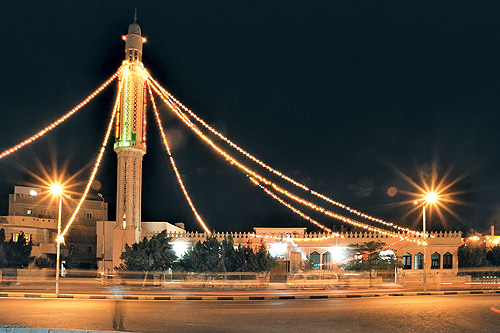
For Muslims all around the world, the sacred month of Ramadan is a time when people fast from dawn till sunset, read more Qur’an, perform more prayers, give more sadaqah or voluntary charity, and worship more than they do at any time during the year.
Muslims around the world generally practice identical types of worship in the same way. However Ramadan customs do vary from one country to another and sometimes even from town to village. When it comes to Egyptians, the holy month of Ramadan is the most special occasion of the year. The saying goes, ‘You haven’t seen celebrations if you haven’t seen Ramadan celebrated in Egypt.’
The Musaharti starts his job before done. The Musaharati is the person who wakes up people to have their pre-dawn meal or Sahur. He ensures everybody wakes up for Sahur by walking in the streets and drumming on a small drum, sometimes singing and even shouting,
A few days prior to the start of Ramadan, and all the way upto the end of the month, streets are littered with people rushing to buy Ramadan specialities. The innovative and artistic pastries, cakes and cookies like the Basbousah, Konafah and Katayef were first introduced by the Fatimids, and are available everywhere ever since. Eldin (apricot juice) and Qamar crowns every table in almost every home. To add to this are Zabadi (yoghurt), Medamis (fava beans) and delicious and colorful jars of Torshi Baladi or home-made pickles.
In certain parts of the country, especially in large, populated cities like Cairo, social solidarity is portrayed in the form of what is called charity banquets. Wealthy businessmen pay their Zakat or annual alms by providing food for the poor and needy who are not able to afford the means to break their fast. Tables and chairs set up with free food for anyone in need of it in almost every street corner.
A great silence falls over the old city of Cairo as the sun sets. Suddenly, the roar of four primitive cannons from the Saladin Citadel shakes the entire city, announcing Iftar or the infringement of the fast. Thousands of mosques call the faithful to prayer in Maghreb. The adhaan ringing out of radios loudspeakers and televisions to shatter the silence.
Mosques are filled with worshippers during the five times of prayer and especially during Taraweeh prayers. You can hear the soulful sound of ‘Allahu Akbar’, which means God is the Greatest, everywhere you go.
The medieval neighborhoods and ancient mosques of Cairo are all decorated with fanous Ramadan or Ramadan lanterns during Ramadan. Every building, street, mosque, lane and alley is lit up.
The contemporary fanous are generally shaped from coloured glass, tin and wire rings, and are lit by a candle. These days, plastic battery-operated versions are also available, but they lack the original charm.
There are several different stories about the origins of the fanous. Dating from the times of the rule of the Fatimid Caliph, Al-Hakim Bi-Amr Allah is the most interesting story. According to the story, women were only allowed to step out of their homes during Ramadan, and before this, a little boy carried a copper lantern signaling the men in the streets to move away. Even after these laws were relaxed, people loved the lanterns so much that their children could be seen carrying them in the streets every Ramadan. Fanous has always been an integral part of Ramadan in Egypt since then.
The most probable origins of fanous , however, were described by Al-Maqrizi. He dates it back to the Coptic Christians celebrating Christmas by lighting up the streets of ancient Egypt with colorful candles. The custom of celebrating with lights dates back even further to the torches handled by the Ancient Egyptians, which was carried on by the Coptics, who used candles. Today, it endures with Fanous Ramadan.